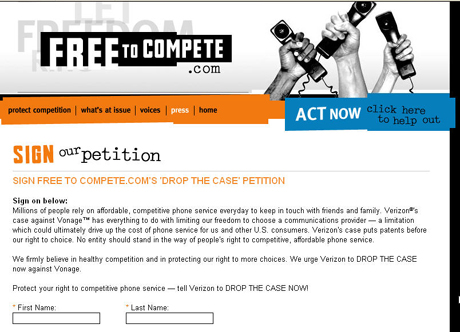Vonage: when we battle Verizon, we're fighting "The Man"


Well, if Vonage can't totally convince regulators, legislators, and judges of the righteousness of its cause, then Vonage can always try impressing us.
The people, man.
That'd be all Americans of voting age that don't happen to be regulators, legislators or judges.
That's the only reason I can think of for Vonage's new Free To Compete website, which launched earlier today.
There's a petition on the site. More about that in a bit, but that petition is accessed from a landing page where Vonage opens up re: how it really, really feels about Verizon, the patent infringement mess, and how that impacts us.
"Verizon has pursued litigation against Vonage in an effort to achieve in court what it cannot achieve in the marketplace," the landing page notes.
"Verizon has sued Vonage over patents they claim cover all of VoIP. Why?Verizon’s actions could limit the freedom you – and every U.S. consumer – have in choosing your phone service. When competition is stifled, consumers literally pay the price," Vonage adds. "And in a fair, free market economy, no entity should be able to cripple or eliminate companies seeking to provide more (and better) alternatives."
Then, Vonage tackles the presumably cynical:
"DON’T BELIEVE IT? Verizon said it themselves in court, that these patents, when they filed for them, would be used to “screw” competitors. If this case stands, it threatens not only Vonage, but potentially the entire competitive VoIP industry. This is why Vonage is fighting “The Man” – and you can, too. It’s all about choice, freedom and savings, and it’s time that you have a voice in protecting the number of phone providers, competitive prices and future innovations you deserve."
"The Man?"
I guess in an era where revolutionary songs from the 1960s are now used in advertising to sell HMO policies, using a revolutionary parlance originally from that same era is de rigeur, as well.